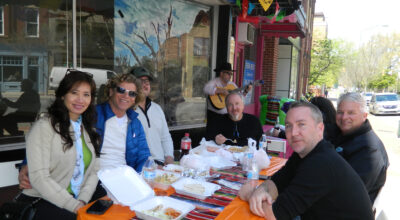Salisbury City Council denies permit for Firehouse Brew Pit
Published 12:00 am Wednesday, February 17, 2016
By Amanda Raymond
amanda.raymond@salisburypost.com
The Salisbury City Council has denied the issuance of a special use permit (SUP) for the Firehouse Brew Pit.
After evidence from proponents and opponents of granting the permit, the council found that one of the standards required to issue the permit that concerned public safety was not met.
According to Preston Mitchell, Planning and Development Services manager, the private bar started out as a temporary space for Benchwarmers, a sports bar that was located at 113 E. Fisher St. The bar was moved to the space at 113 S. Lee St. while the Benchwarmers location was under construction.
Todd Littleton, owner of both bars, was issued a temporary use permit (TUP) with conditions to operate the bar at the South Lee Street location. He was then granted an extension of that permit. The permit expires on March 1.
Mitchell said that Littleton has also submitted plans to convert Firehouse Brew Pit into a restaurant. Granting the SUP would allow Littleton to keep operating the bar until the restaurant would be up and running. If the bar becomes a restaurant, then the SUP would not be needed.
Since construction for both Benchwarmers and the Firehouse Brew Pit were not far enough along, Mitchell said staff suggested that Littleton apply for an SUP.
Littleton’s case for receiving an SUP was presented before the Salisbury Planning Board. After hearing testimony from proponents and opponents, the board recommended denial of the permit because the standard concerning safety was not met.
According to meeting documents, the standard states that “the public health, safety and welfare will be assured and the proposed development will not substantially injure the value of adjoining property and associated uses if located where proposed.”
The Planning Board and council both found the first two standards were met. The first standard required the bar to meet all of the “required principals and specifications of the ordinance and any adopted land use plans and is in harmony with the general purpose and intent and preserves its spirit.” The second standard required that the plan proposed by Littleton visually and functionally matched the surrounding area.
There was also an additional standard that the bar not be located within 500 feet of any school. The Planning Board and council also found that standard was met.
Littleton and Chris Ostle, an employee of the bar, spoke in favor of granting the bar the SUP. Littleton presented records of incidents reported to police and said most of the calls were about problems that were not on the bar’s property.
Littleton said he has closed the courtyard between the bar and the Firehouse Lofts next door until it can be secured. The lofts have put up a fence between its building and the bar. Littleton said he has tried to control the exterior of the bar.
Ostle said they have kept people from returning to the bar if they have caused problems.
“We work hard to ensure that we have a safe atmosphere,” he said.
Littleton said they work hard to control what is going on inside of the bar, but have less control over what customers do outside of the bar. He said he works to remedy any problem that is brought to his attention.
“Whenever there is a problem, we address it immediately,” he said.
Ostle said most of the problems people have experienced are not unique to the Firehouse Brew Pit.
Littleton said he plans to build a fence to match and extend the one already on the property in order to enclose the courtyard area.
Opponents of issuing the permit came from members of the Firehouse Lofts Membership Association, other residents of the loft and a neighbor who lived in the surrounding area.
Judy Kandl, secretary for the association, presented police records showing that the noise complaints occurred after the city’s noise ordinance had taken effect. She also gave the council a letter from the Salisbury Police Department stating that Littleton has not hired police officers as extra security for the bar. The SUP application stated that extra security was employed at the bar, including off-duty uniformed officers.
Other loft residents spoke about the issues they have encountered since the bar moved into the area. They talked about witnessing and hearing foul language, violent arguments, public urination and vomiting and bar customers passing out. There was even an instance of two bar customers having sexual intercourse on the stairs leading to the bar’s basement.
Kimberly Crowley, a resident of the lofts, said she is used to living with downtown noise but the noise from bar customers is on another level.
“It’s a disturbance on a nightly basis,” she said.
Crowley also noted that she lives directly above the Salty Caper restaurant, which also serves alcohol, and has not experienced the same issues.
Jeff Wilson, property manager for the lofts, said the bar had an Alcohol Law Enforcement violation because an ALE officer found that there were people in the bar who were not members.
Kandl said although they were not in favor of approving the SUP, they would be in favor of extending the TUP for the bar under certain conditions. Some of those conditions included controlling access in and out of the bar, complying with the noise ordinance and controlling the courtyard and customer behavior.
“We want to see Firehouse Brew Pit succeed … but not at the price of downtown Salisbury and its perception and its impression,” she said.
After hearing the testimony, Councilman Brian Miller said Littleton had to be able to control his customers.
“There’s no place in our downtown for the kind of things I heard today,” he said.
Mayor Pro Tem Maggie Blackwell agreed. She said the decision was difficult because the council never wants to “terminate a thriving business.”
“This is not the decorum that we expect either in council chambers or outside and it’s not the quality of life that we strive to provide to our citizens,” she said.
Councilman Hardin said the decision was easy for him because he felt like the proponents were not honest about the bar’s issues. He also said he thought there was a lack of control over customers and the bar’s problems affected the areas livability and desirability.
Councilman Post pointed out that the council did not hear any evidence concerning the impact the bar would have on the value of the adjoining property. He also said the Planning Board delayed making a decision on the permit so that Littleton could address the safety issues, but he did not feel that the issues were addressed.
After stating the findings of fact, the council unanimously voted to deny the permit.
Mitchell said the language of the TUP could allow for more time for the bar to remain open. He said he will discuss the permit with administration and Littleton.
In other council business, the council:
- Approved the consent agenda.
- Heard highlights and goals presentations from the Alternate Methods of Design Commission, Historic Preservation Commission, Planning Board and Zoning Board of Adjustment.
- Held a public hearing for the use of 2016-2017 Community Development Block Grant and HOME program funds.
- Adopted a resolution to extend the Downtown Municipal Service District to include 10 parcels in the 400 block of North Lee Street.
- Adopted an ordinance to rezone a property at 1428 Jake Alexander Blvd. S.
- Adopted an ordinance to prohibit parking at all times along a portion of King Street. Councilmen Post and Hardin voted against the motion to adopt.
- Awarded a $869,132.25 contract to Gilbert Engineering Company for the construction of the Centerview Lift Station Outfall Project.
Contact reporter Amanda Raymond at 704-797-4222.




